An Interview with RKC Team Leader Annie Vo
by Adrienne Harvey, SrPCC, RKC-II, CK-FMS, Primal Move Nat'l Instructor
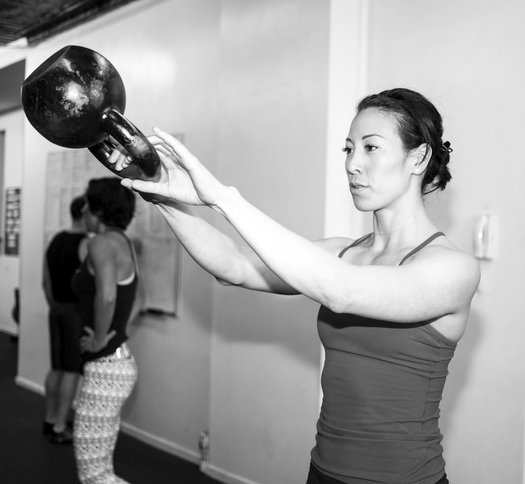
Dragon Door: How did you first become interested in fitness?
Annie Vo: I was never a natural athlete. In high school, I was in marching band but kind of made it a point to avoid doing much physical activity. But when I went to college on a full academic scholarship, I had no concept of how expensive New York would be since I came from a smaller town near LA. I am not ashamed of my scholarship, but I didn't realize how broke I would be when I moved to NY! The gym on campus became my only outlet because it was covered by my tuition. So while at school I would either be in my dorm, the classroom, or the gym—which was s completely unfamiliar environment!
I was excited about being in the gym even if I didn’t really know what I was doing yet. It was so opposite from what I was doing in the classroom. Since I studied philosophy, it was mentally rigorous with a lot of reading and writing, but also incredibly sedentary. Soon I started looking forward to the gym because it was something different to do. Training is also analytical, I could take the big concepts from my studies, look at them in a different way and play around with them in the real world.
I hadn't fully committed to a
fitness career at that point, and was considering law school or continuing in philosophy after graduation. In the mean time, in order to make ends meet, I decided to get a job at the gym. I started working at Equinox with no certifications, and got my personal training certification during the first couple of months working there. In that period of time, I realized that I just loved it.
Training others really incorporated all the things I enjoyed about my academic career and musical careers—it was creative, there’s a social element, an intimacy element, and a very practical side of helping people set goals then see it happen. Like philosophy, we would need to observe, theorize, debate, and find multiple solutions to the same problem. Training allowed me to do all of this in the same job, and while using a different approach with each client.
What I love the most is getting to know where each person is coming from and how to help them solve complex problems that are part muscular, part neurological, part emotional, and part intellectual too. Over time it became obvious that I really wanted to work in fitness, and I let my applications for law school go.
Dragon Door: What musical instruments did you play?
Annie Vo: I played classical piano, bass, and then snare drum in marching band. I was a classical pianist growing up, but there can only be one piano player in an orchestra. While my skills were good, I wasn’t the best piano player in the elementary school in Long Beach, California and then the orchestra needed a bass player so I learned how to play bass. So I played in professional orchestras, and traveled with them too.
By high school I needed to do some kind of P.E. class. After begging my counselor about any way to avoid P.E., they said I could play in marching band for all four years instead. None of the instruments I knew (piano or upright bass) translated into marching band instruments other than xylophone, which I wasn’t interested in playing. So I took up a whole new instrument—snare drum—to avoid P.E. class!
Dragon Door: Earlier, you mentioned your college major in philosophy. Do you have a favorite philosopher whose ideas are relevant to your training, or that inspire your approach to training?
Annie Vo: Columbia's philosophy department is considered to be an analytical department so we were primarily studying logic, language based arguments, and things like that. My favorite philosopher of all time is Bertrand Russell because of his work in logic and linguistics. It's hard to say what other philosophers have influenced my training now that I'm reading philosophy on my own for fun and often think, "Wow this greatly impacts my business today!"
My original roots are based on communication—how do we communicate concepts to someone so that they understand what we are saying, and so that we are inviting them to participate or respond. That’s why I think it’s a mistake for trainers to use large scientific or anatomical words when communicating with clients. They are only communicating that they’re trying to be intellectual or special rather than inviting the client into a conversation. That is probably the biggest takeaway from studying communication and our role in it. As a coach, am I just vomiting big words on these people because I am insecure, or am I coaching in a way that will engage them and help them improve themselves? Will it communicate my own confidence in my coaching and the client’s ability to make changes? Am I able to listen to my clients and give them cues and objectives they can relate to?
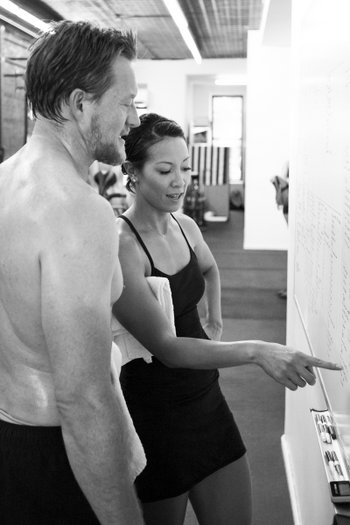
There’s also the difference between what people think they are trying to do and what they are actually doing. Those two views can be very separate—and it is not a "right or wrong" thing—but the question is how do we bring those two views closer together without judgment or blame. It's difficult to help someone bridge that divide when they're feeling vulnerable. Some clients need an emotional approach, some an intellectual approach. These concepts are really involved with analyzing language and the ethics of how to treat people and yourself.
I have to confront those things in myself so I can be as clear a guide as possible. I have to wash my approach of all my own intentions or old issues—because it isn’t about me imposing my will, it’s about how I can best help solve a problem.
Dragon Door: How did you decide to add kettlebells to your training?
Annie Vo: My business partner Antonio introduced them to me. Antonio found kettlebells and the RKC by following Steve Maxwell—who has influenced us a lot over the years. Antonio is the driving force in our fitness pursuits since he's been in the industry longer, and is always looking for more information about training. He got his
RKC certification in 2007, and kettlebells are very important to his training and development. He was adamant about his coworkers learning to try kettlebells in order to "do some real training." Before then, I was still doing more conventional exercises like lat pull-downs.
Antonio and I have a very important relationship as business partners and best friends. We've been through so much opening up the gym in 2011, and from doing all these certifications together—RKC,
FMS, Gym Jones. Our program design is based on Gym Jones, and our individual programs are designed by Rob McDonald. Kettlebells have been a big part of it. Since I had no physical education background whatsoever, I needed the solid foundation in technical movement from kettlebells.
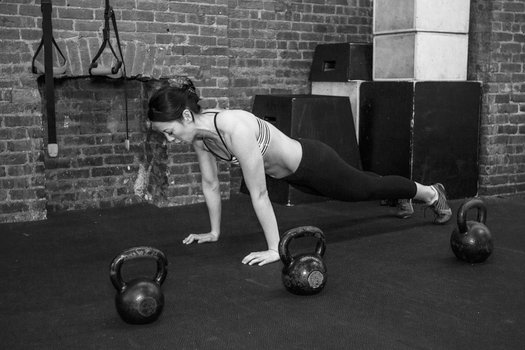
And then I was also all banged up from playing bass—one arm couldn't go over my head, and the other was all jacked up! It’s been an ongoing process since my skeleton adapted in a fundamental and neurological level to a certain shape from playing bass! Undoing it is an uphill battle. Without the
fundamental kettlebell training, I don't think I would know I could change it, or be able to make significant changes at all!
Now that the training we do is Gym Jones, without RKC kettlebell training, there's no way that I'd be able to excel at any of the workouts because I wouldn't have the necessary mental discipline and proper technique to execute the lifts safely. The
RKC snatch test used to be my nightmare back then, and I still try to remind myself of when it seemed impossible for me.
Dragon Door: It is so important to remember that "impossible" feeling so we can empathize with clients who are starting out. I try to work towards difficult goals for that very reason.
Annie Vo: I think it’s a mistake to forget that feeling, we need to be real people with something to share that isn’t ego driven. We have to keep that perspective for our own lifelong training, as well as sharing training with others.
Dragon Door: How did you decide to co-found Precision Athlete?
Annie Vo: Antonio and I wanted to create an environment where we could try out many training modalities—
kettlebells, barbells, bodyweight, clubbells, sandbags, what have you. At first we were still at a big gym and renting spaces in other buildings for boot camps and to try different methods. The environment in the big gym was not very conducive to real training, there was no space and the attitude wasn't right. In a large gym, there are so many people without direction. It's not their fault, but most are just paying a monthly fee to go through the motions and don't have a plan. So when there are many people in a room with no plan on all these different pieces of equipment, and we are trying to train people to try a kettlebell swing it’s distracting. People leer and say, "That looks dangerous" or interrupt or are distracting.
So we decided to take a huge leap and find a quiet place for our style of training. We started looking around the neighborhood where we lived just a block away from each other on the Upper West Side near Columbia University. We have been open since February 2011. It's a small space, but we have everything we need.
Dragon Door: What's your next goal?
Annie Vo: It's a little more personal, but right now my goal is to gain weight because I need to have surgery. I have braces and need to get my palette expanded, on an adult this procedure requires surgery. I will be incapacitated for several weeks after the surgery which will require screws in my head. So, I have been on a hypertrophy and mass gain program and have gained 6 pounds in 8 months.
From a fitness standpoint this is not much different than my past goals, because I am always working on overhead pressing while trying to balance things out. It’s been an interesting process. Phase one was simply to get my right arm to go overhead, and when I accomplished that, I found out that my left arm was all jacked up! While fixing my left arm, I learned that my right arm had a lot of untapped potential!
Then, I started taking bass lessons again because I hadn't played professionally in over a decade. Interestingly, playing bass flared up all my old issues from before I could put my arm overhead! The good news is I can still play bass pretty well, but the bad news is that playing bass brought back all the initial problems I had before I started working with kettlebells!
Obviously I am in a better place now than before, but from a baseline neurological reflex level, it has flared up a lot of the same movement patterns, inhibitions, and range of motion problems. It's kind of weird!
I continue to see an active-release chiropractor every week, and have for the last 5 years, so I do have a guide in this process. I let him know that I've flared it up again, he helps undo it so I can go back and try something different! I do a lot of "guess and check" with my shoulders!
Dragon Door: What is your favorite kettlebell move?
Annie Vo: The goblet squat because it's always seemed like a natural move to me, and the kettlebell clean and jerk because it is the hardest move for me to do. The kettlebell clean and jerk has shown me all of my body's imbalances, as well as my fear of failure. And it’s a cool move that shows me that I still have a lot more work to do. It’s a checkpoint, or like a little sculpture that adapts over time to show my progress. It also showed me right away how my shoulder got worse when I started playing bass again, and would need to work even more to sort everything out.
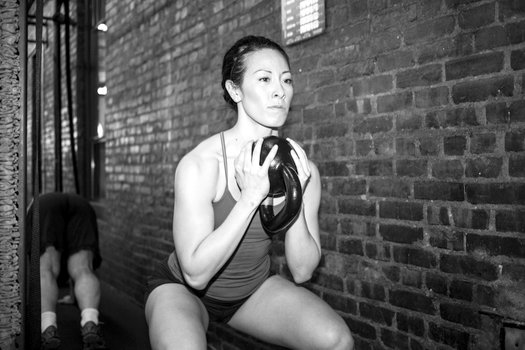
Dragon Door: What will you contribute in your role as an RKC Team Leader?
Annie Vo: Help and a good attitude! I have really believed in the whole
RKC organization from day one. John and I have always had a really good rapport. I like how the RKC now has kind of a "black sheep" feeling which I have come to love and embrace. In our current incarnation I feel like I can be myself and can share that I studied philosophy, had no real fitness background, and have come here from the ground up. There's a value in that. I feel like I can actually feel good about my unusual background and still be respected in this organization.
I want to bring my excitement for training and for philosophy. I have always practiced with the aim of perfection whether intellectually or physically—with the repetition, discipline, observational skills—and the need to be lead by facts. I'm not afraid to be wrong. I want to support more women being involved, and am thrilled that there's no one male demigod roaming around! All that stuff is just so retrograde, and doesn’t help trainers become better trainers.
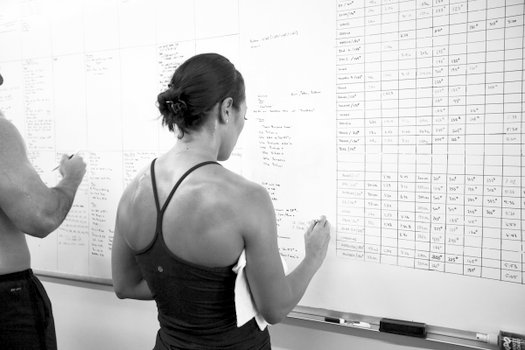
I never want to be the person who says, "I am a pro coach, I don't need to learn anything else." Right now, I'm in a gymnastics level one class because I want to keep learning and I also don’t want to forget what its like to be a total beginner. There's so much that I need and want to learn. I am passionate about the way my gym works, and even though I know the programming style like the back of my hand, I never want to think that I know everything about everything. I don't even want to be around people who think that they do know everything!
I also don't want to be someone who says that there's only one right way to do something. All of us have work to do, and more to learn!
Back